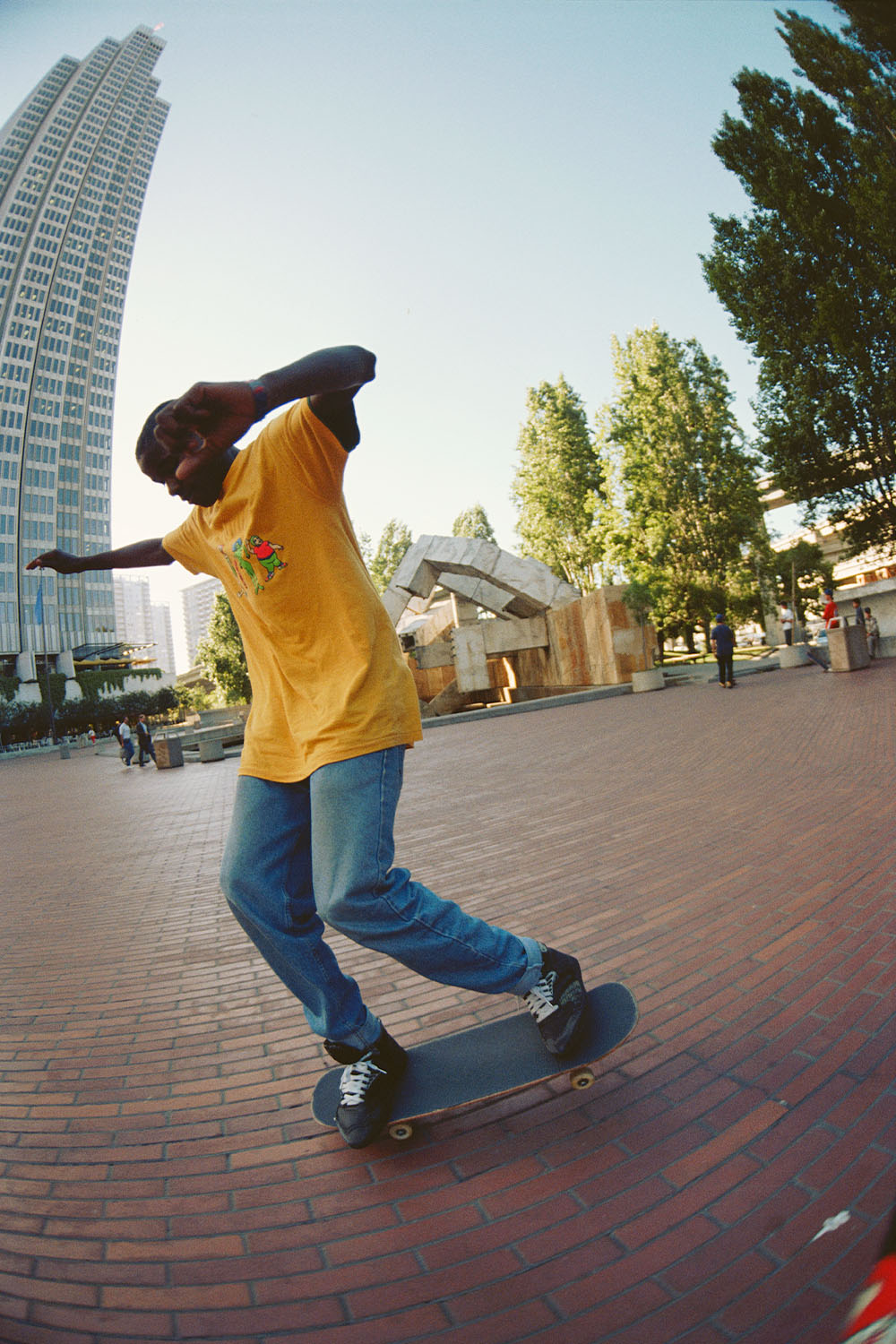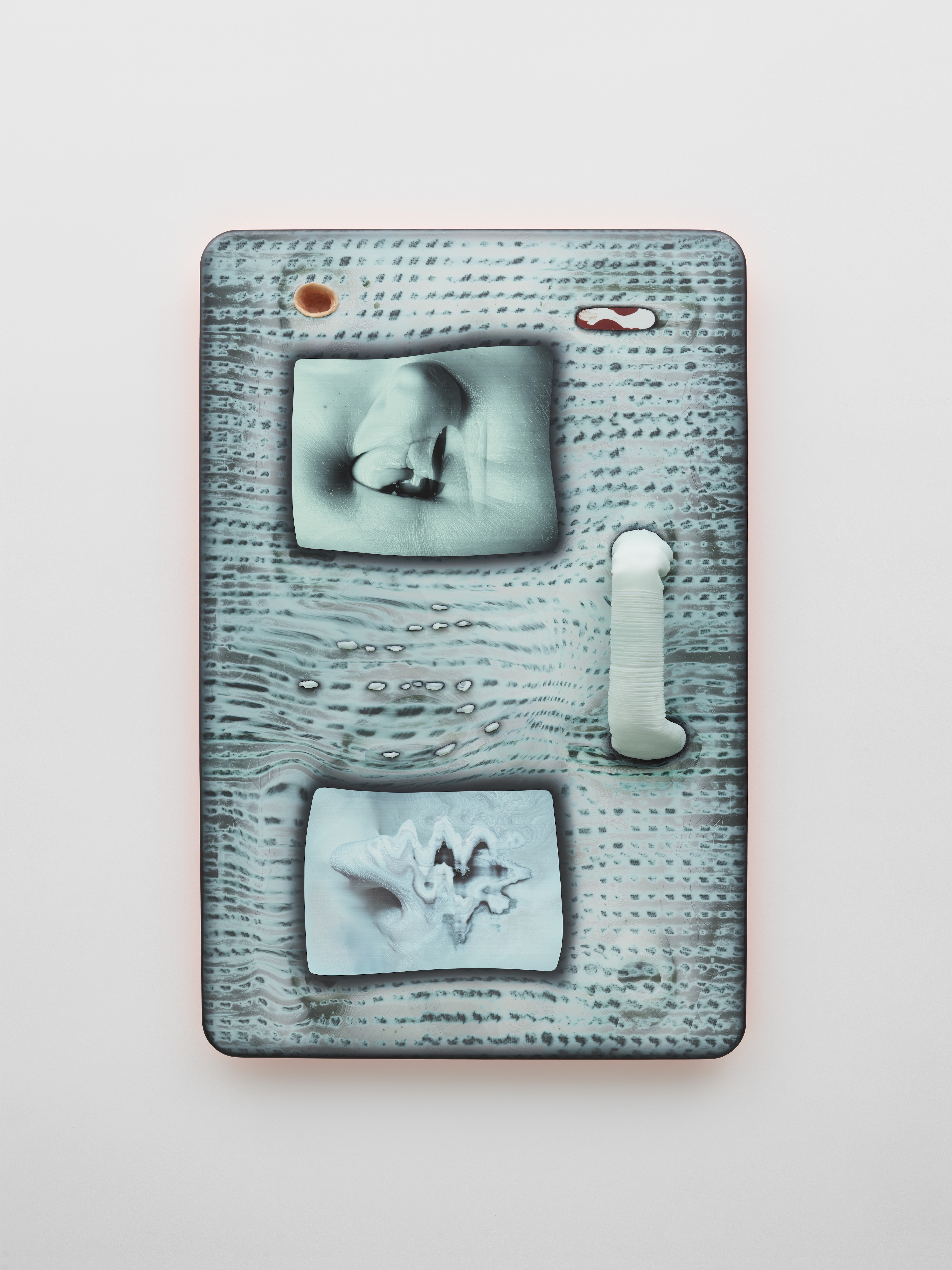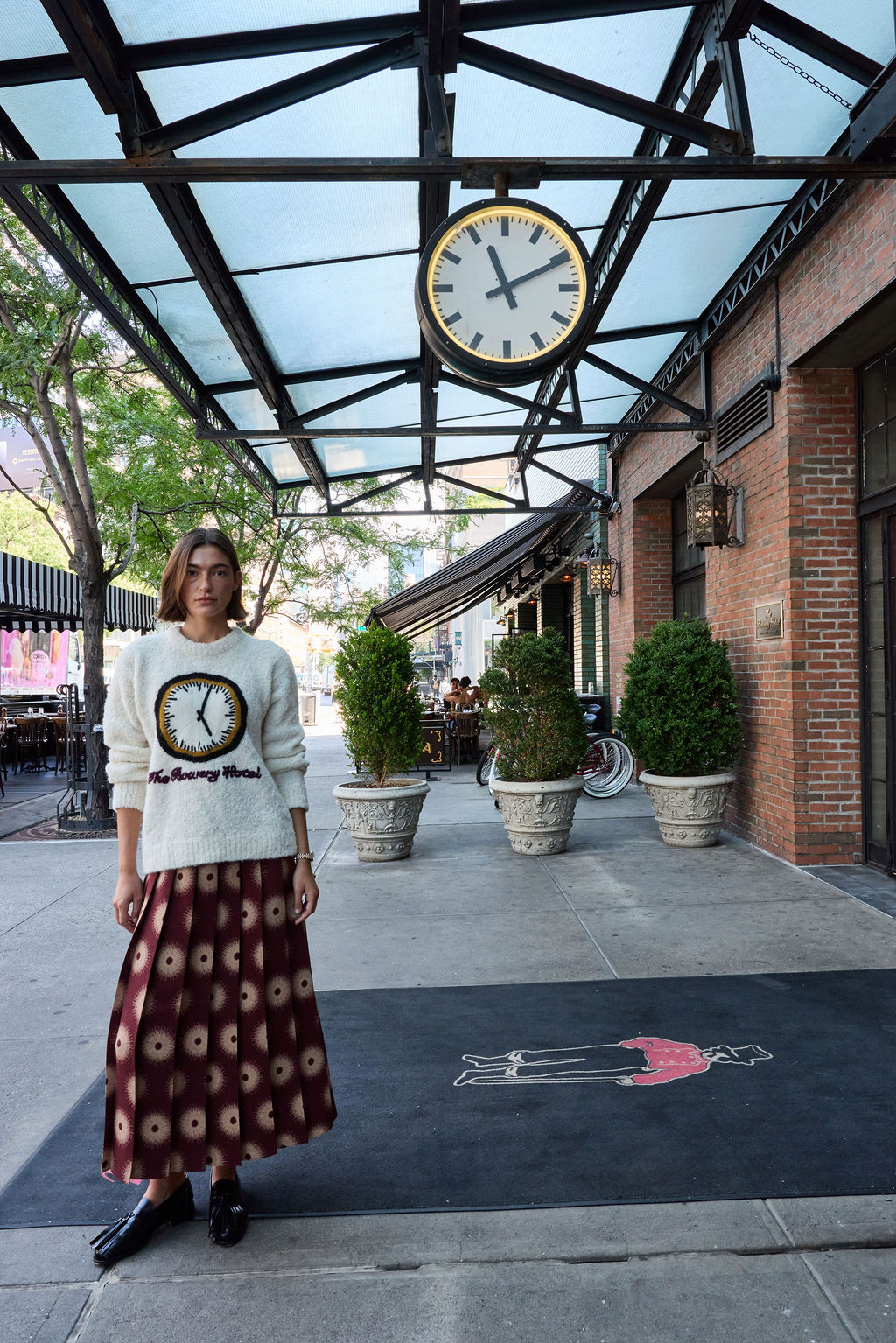

















Brian Eno
“The early part of this century has seen people realize that neoliberal economics have failed. It has been a machine for concentrating wealth, just as the internet has become a machine for concentrating prejudice. And while it succeeded in concentrating wealth, it left a mass of poor, disenfranchised people looking for radical, populist solutions.”
Never meet your heroes. At least that’s what the old adage suggests—of course, whoever coined that term had apparently never met Brian Eno, who has just handed me his closed laptop, insistent that I try this unusual method of notation. It is an undeniably excellent surface to write on (“You must use a good soft pencil” he tells me). Although I only manage a few crosshatched lines before handing it back—vaguely panicked that I’ll go down in history as the man who ruined Eno’s MacBook with terrible art. As introductions go, writing on the smooth (wipe-clean) surface of an aluminum computer is the kind of unexpected, eccentric, and yet wholly practical idea that exemplifies Eno’s approach to his work, which has always blended experimentation, surprise and staunch adherence to functionality.
Boiling down his career solely to musicianship could be seen as a disservice to his talents as an artist, writer, producer and cultural icon—and yet, he is also undeniably one of the great musical innovators of the last century. After leaving art school, Eno joined Roxy Music in the early ‘70s, working with them on their first two LP’s, before leaving to pursue a solo career, which saw the release of landmark art-pop records, including _Here Come the Warm Jets_ (1974) and _Another Green World_ (1975). The latter of those would edge him into a new sonic territory, producing soundscapes, which he would codify on _Discreet Music_ (also 1975) and _Music for Airports_ (1978)—inventing ambient music in the process. It’s a genre Eno has returned to on-and-off throughout his career and is at the heart of his newest album, _Reflection_ (via Warp Records) and its accompanying iTunes app—both out January 1st, 2017.
Born on the Suffolk coast in 1948, Eno’s career has followed the trajectory of a man searching for something beyond the blue horizon, with his entire career unflinchingly angled towards the future. So, while it might seem like an unusual decision to make an album that ‘looks back,’ that was far from his intention. “I was making a piece of music called ‘Late Autumn,’ and while I listened to it, I would always go off into a sort of reverie, one where I would start thinking about things that happened in the recent past,” he recalls as we sit in his spacious studio, tucked away in a private London mews. “We spend a lot of time in the now, and quite a lot of time thinking about the immediate future—but it’s considered melancholic or nostalgic to think about the past. And yet it’s exciting because these thoughts are unsorted, so you need to find the bits you want to take with you and the pieces you want to leave behind—learning from them in both the present and the future.”
_Reflection_ is a beautiful record; a fifty-four minute (and one second) opus of elegant ambiance, which ebbs and flows like an autumnal breeze through a forest. It has been created by Eno, who is now 68 years old, using a complicated process which he breaks down into three stages for me using diagrams (drawn for me on his laptop) that include circles and waves of sound. “I suppose what I’m interested in with ambient music is a certain level of continuous variation,” he says, “but I don’t want the kind of variation you would get in a pop song or a classical piece. What I want is something akin to sitting by a river. So it’s continuous, albeit within quite a restricted range.” Then he says, with an explanatory laugh, “That means the river isn’t going to suddenly turn blue, or burst its banks, or turn to concrete.”
The LP is crafted using what Eno describes as a process of generative music. It’s a complex notion, but in layman’s terms, it sees him input sound into his computer, then inject a series of patterning algorithms, which alter the music in subtle ways. This means that while there will inevitably be things outside of his control, nothing will ever sound the same. “In conventional forms of composition you design the piece like an architect—you lay out the structure in advance,” he explains, “but this isn’t like architecture, it’s more like gardening—where you make the seeds, put them in the ground and watch how they grow. I start without much of an idea about how it’s going to end up—sometimes it starts with an experiment or a single feeble idea,” he laughs, “but occasionally they grow into something interesting, and then I start asking questions of them. What do you exist for now you’ve now passed the stage of being an interesting technical experiment? What can you offer the world?”
Eno will then have the endless composition “kaleidoscoping through its existence“ on speakers around his studio while he works on other projects, patiently tweaking the algorithms and “hybridizing the seed” to better fit his concept. “A lot of these rules are designed to only affect 1 or 2 percent of the material. So you have to do a lot of listening and see what happens, because there is no beginning or end—I mean it does have one on the record, but that’s just an hour out of the lifetime of the piece.” For an artist who is well known for his love of precision, this type of generative work seems to almost go against his principles, surrendering control to the sound; but as he explains, this isn’t an entirely new idea in art. “It’s something artists have been doing for quite a long time—allowing the material to have its own life. It’s a dialogue between you and the material you’re working with and if you fight against it, that doesn’t produce good results.”
Breaking down this block of sound—which is generated to have infinite permutations—and adding a human touch is the essence of Eno’s work. “If you’re thinking about a single piece of music, which people will listen to over-and-over, as opposed to the app—which generates music over a one year cycle—then you need to think about it in terms of \[more conventional\] composition,” he explains. What Eno ended up with was three, distinct hour-long segments that stood out from the rest, due to their “strange and exotic alignments.” Even for Eno, the generative process doesn’t always produce the precise results he’s after; “The funny thing is, in the end, I made a splice between two of the pieces,” he explains. “One had such a lovely beginning, but the ending of another was also great…then I thought ‘hold on I’m a bloody musician, and this is a studio, so why not put them together?’ It felt quite transgressive in a way,” he says laughing.
Between last year’s work (_The Ship_) and the upcoming release of _Reflection_, this is the fastest consecutive string of releases from Eno since the ‘90s. This sudden burst of activity from his studio which houses an archive of 4800 unfinished works, is the result of a practical desire to get work out while he’s still interested in it. “If you go into the kitchen of a busy Italian restaurant, you’ll see food being made the way I would like to make music: good ingredients, good principles, and the minimum amount of time spent on it. Just cook, then serve it while it’s fresh,” he says. ”I don’t want things finished when I’ve tidied them up and taken off the rough edges; I still want to have some fiber and texture—because if you don’t get the timing right and start dicking around with things, you can quickly ruin them.”
With his new album arriving at the beginning of 2017, after a year in which musical champions have become an endangered species and the political landscape has taken a radical turn—_Reflection_ is a reminder of the importance of great art and artistry. Despite the news reminding us that the world is in a tailspin, Eno remains optimistic, “I think it’s both the end and the beginning—it’s certainly a hinge point. It’s especially the end of the notion that a successful way to the future was allowing the individual to be the most important part of society,” he says. “The early part of this century has seen people realize that neoliberal economics have failed. It has been a machine for concentrating wealth, just as the internet has become a machine for concentrating prejudice. And while it succeeded in concentrating wealth, it left a mass of poor, disenfranchised people looking for radical, populist solutions.”
Eno was shocked by the UK’s decision to leave the EU. “I was completely humbled by this result,” he says. “I thought they were in a bubble, but it was me. I wasn’t paying attention, and I felt utterly ashamed.” I notice a copy of _Adbusters_, which is propped up against a wall in his studio. On the cover is an image of Donald Trump with the barcode placed squarely and strategically on his upper lip. It brings us round to a conversation about the President-elect and Eno’s thoughts on the ‘radical populist solutions’ taken recently in America.
Eno, ever the non-conformist thinker has an answer, which at first takes me by surprise, “I’m pleased Trump got elected,” he says. “Mainly because I think he will make such a tremendous fuckup that Americans will finally get off their bloody iPhones and do something.” He laughs. “I have a lot of American friends, and my experience is that the more sophisticated they are the less they want to be involved in politics. They say things like ‘we don’t do politics’ as if it’s some sort of sordid thing to do, like masturbating in public.” It’s at this point that Eno recalls a quote from William Butler Yeats’ _The Second Coming_ \[1919\], which feels hauntingly apt: “The best lack all conviction, while the worst are full of passionate intensity.“ “That’s so often the case,” he continues. “You knew that every single Trump supporter was not only going to vote, but they were also going to go knock on the doors of their neighbors, friends and relatives to get them to the polling stations. But the liberals wouldn’t turn up to vote because it wasn’t cool or they were too busy on Instagram.”
While Eno is happy to hold forth on geo-politics, he remains most at home in his studio, taking me into a side room, to show me exactly how the algorithms affect his music. We stand in front of a bank of screens as he eagerly shows me the different ways in which he manipulates sound—tweaking scripts as he revels in stray sounds that blast from the speakers. As a producer, Eno believes people do their best work when they’re at the edge of what they can understand, “Or just over the edge, because if you’re somewhat lost, then you’re at your maximum alertness.” It’s a technique he’s used with David Bowie, U2, and Coldplay amongst many others. But why is he driven to impose those elements on himself? “I want to be somewhere unfamiliar, but I don’t want to be somewhere completely alien,” he explains. “One is an area of competence, while the other is an area of bafflement, and you want to be on the tightrope between them.”
It seems, for Eno at least, it’s about being alive and alert, challenged and yet curious; “People say that time passes much quicker when you get older,” he says. “Well, time passes quickly when you’re not having fun or when you’re not paying attention. So if you want to live a longer life you need to live more dangerously.”
Written by Tom Fenwick Photographed by Fe Pinheiro
 

 

 

 

 

 

 

 

 
Brian Eno
“The early part of this century has seen people realize that neoliberal economics have failed. It has been a machine for concentrating wealth, just as the internet has become a machine for concentrating prejudice. And while it succeeded in concentrating wealth, it left a mass of poor, disenfranchised people looking for radical, populist solutions.”
Never meet your heroes. At least that’s what the old adage suggests—of course, whoever coined that term had apparently never met Brian Eno, who has just handed me his closed laptop, insistent that I try this unusual method of notation. It is an undeniably excellent surface to write on (“You must use a good soft pencil” he tells me). Although I only manage a few crosshatched lines before handing it back—vaguely panicked that I’ll go down in history as the man who ruined Eno’s MacBook with terrible art. As introductions go, writing on the smooth (wipe-clean) surface of an aluminum computer is the kind of unexpected, eccentric, and yet wholly practical idea that exemplifies Eno’s approach to his work, which has always blended experimentation, surprise and staunch adherence to functionality.
Boiling down his career solely to musicianship could be seen as a disservice to his talents as an artist, writer, producer and cultural icon—and yet, he is also undeniably one of the great musical innovators of the last century. After leaving art school, Eno joined Roxy Music in the early ‘70s, working with them on their first two LP’s, before leaving to pursue a solo career, which saw the release of landmark art-pop records, including _Here Come the Warm Jets_ (1974) and _Another Green World_ (1975). The latter of those would edge him into a new sonic territory, producing soundscapes, which he would codify on _Discreet Music_ (also 1975) and _Music for Airports_ (1978)—inventing ambient music in the process. It’s a genre Eno has returned to on-and-off throughout his career and is at the heart of his newest album, _Reflection_ (via Warp Records) and its accompanying iTunes app—both out January 1st, 2017.
Born on the Suffolk coast in 1948, Eno’s career has followed the trajectory of a man searching for something beyond the blue horizon, with his entire career unflinchingly angled towards the future. So, while it might seem like an unusual decision to make an album that ‘looks back,’ that was far from his intention. “I was making a piece of music called ‘Late Autumn,’ and while I listened to it, I would always go off into a sort of reverie, one where I would start thinking about things that happened in the recent past,” he recalls as we sit in his spacious studio, tucked away in a private London mews. “We spend a lot of time in the now, and quite a lot of time thinking about the immediate future—but it’s considered melancholic or nostalgic to think about the past. And yet it’s exciting because these thoughts are unsorted, so you need to find the bits you want to take with you and the pieces you want to leave behind—learning from them in both the present and the future.”
_Reflection_ is a beautiful record; a fifty-four minute (and one second) opus of elegant ambiance, which ebbs and flows like an autumnal breeze through a forest. It has been created by Eno, who is now 68 years old, using a complicated process which he breaks down into three stages for me using diagrams (drawn for me on his laptop) that include circles and waves of sound. “I suppose what I’m interested in with ambient music is a certain level of continuous variation,” he says, “but I don’t want the kind of variation you would get in a pop song or a classical piece. What I want is something akin to sitting by a river. So it’s continuous, albeit within quite a restricted range.” Then he says, with an explanatory laugh, “That means the river isn’t going to suddenly turn blue, or burst its banks, or turn to concrete.”
The LP is crafted using what Eno describes as a process of generative music. It’s a complex notion, but in layman’s terms, it sees him input sound into his computer, then inject a series of patterning algorithms, which alter the music in subtle ways. This means that while there will inevitably be things outside of his control, nothing will ever sound the same. “In conventional forms of composition you design the piece like an architect—you lay out the structure in advance,” he explains, “but this isn’t like architecture, it’s more like gardening—where you make the seeds, put them in the ground and watch how they grow. I start without much of an idea about how it’s going to end up—sometimes it starts with an experiment or a single feeble idea,” he laughs, “but occasionally they grow into something interesting, and then I start asking questions of them. What do you exist for now you’ve now passed the stage of being an interesting technical experiment? What can you offer the world?”
Eno will then have the endless composition “kaleidoscoping through its existence“ on speakers around his studio while he works on other projects, patiently tweaking the algorithms and “hybridizing the seed” to better fit his concept. “A lot of these rules are designed to only affect 1 or 2 percent of the material. So you have to do a lot of listening and see what happens, because there is no beginning or end—I mean it does have one on the record, but that’s just an hour out of the lifetime of the piece.” For an artist who is well known for his love of precision, this type of generative work seems to almost go against his principles, surrendering control to the sound; but as he explains, this isn’t an entirely new idea in art. “It’s something artists have been doing for quite a long time—allowing the material to have its own life. It’s a dialogue between you and the material you’re working with and if you fight against it, that doesn’t produce good results.”
Breaking down this block of sound—which is generated to have infinite permutations—and adding a human touch is the essence of Eno’s work. “If you’re thinking about a single piece of music, which people will listen to over-and-over, as opposed to the app—which generates music over a one year cycle—then you need to think about it in terms of \[more conventional\] composition,” he explains. What Eno ended up with was three, distinct hour-long segments that stood out from the rest, due to their “strange and exotic alignments.” Even for Eno, the generative process doesn’t always produce the precise results he’s after; “The funny thing is, in the end, I made a splice between two of the pieces,” he explains. “One had such a lovely beginning, but the ending of another was also great…then I thought ‘hold on I’m a bloody musician, and this is a studio, so why not put them together?’ It felt quite transgressive in a way,” he says laughing.
Between last year’s work (_The Ship_) and the upcoming release of _Reflection_, this is the fastest consecutive string of releases from Eno since the ‘90s. This sudden burst of activity from his studio which houses an archive of 4800 unfinished works, is the result of a practical desire to get work out while he’s still interested in it. “If you go into the kitchen of a busy Italian restaurant, you’ll see food being made the way I would like to make music: good ingredients, good principles, and the minimum amount of time spent on it. Just cook, then serve it while it’s fresh,” he says. ”I don’t want things finished when I’ve tidied them up and taken off the rough edges; I still want to have some fiber and texture—because if you don’t get the timing right and start dicking around with things, you can quickly ruin them.”
With his new album arriving at the beginning of 2017, after a year in which musical champions have become an endangered species and the political landscape has taken a radical turn—_Reflection_ is a reminder of the importance of great art and artistry. Despite the news reminding us that the world is in a tailspin, Eno remains optimistic, “I think it’s both the end and the beginning—it’s certainly a hinge point. It’s especially the end of the notion that a successful way to the future was allowing the individual to be the most important part of society,” he says. “The early part of this century has seen people realize that neoliberal economics have failed. It has been a machine for concentrating wealth, just as the internet has become a machine for concentrating prejudice. And while it succeeded in concentrating wealth, it left a mass of poor, disenfranchised people looking for radical, populist solutions.”
Eno was shocked by the UK’s decision to leave the EU. “I was completely humbled by this result,” he says. “I thought they were in a bubble, but it was me. I wasn’t paying attention, and I felt utterly ashamed.” I notice a copy of _Adbusters_, which is propped up against a wall in his studio. On the cover is an image of Donald Trump with the barcode placed squarely and strategically on his upper lip. It brings us round to a conversation about the President-elect and Eno’s thoughts on the ‘radical populist solutions’ taken recently in America.
Eno, ever the non-conformist thinker has an answer, which at first takes me by surprise, “I’m pleased Trump got elected,” he says. “Mainly because I think he will make such a tremendous fuckup that Americans will finally get off their bloody iPhones and do something.” He laughs. “I have a lot of American friends, and my experience is that the more sophisticated they are the less they want to be involved in politics. They say things like ‘we don’t do politics’ as if it’s some sort of sordid thing to do, like masturbating in public.” It’s at this point that Eno recalls a quote from William Butler Yeats’ _The Second Coming_ \[1919\], which feels hauntingly apt: “The best lack all conviction, while the worst are full of passionate intensity.“ “That’s so often the case,” he continues. “You knew that every single Trump supporter was not only going to vote, but they were also going to go knock on the doors of their neighbors, friends and relatives to get them to the polling stations. But the liberals wouldn’t turn up to vote because it wasn’t cool or they were too busy on Instagram.”
While Eno is happy to hold forth on geo-politics, he remains most at home in his studio, taking me into a side room, to show me exactly how the algorithms affect his music. We stand in front of a bank of screens as he eagerly shows me the different ways in which he manipulates sound—tweaking scripts as he revels in stray sounds that blast from the speakers. As a producer, Eno believes people do their best work when they’re at the edge of what they can understand, “Or just over the edge, because if you’re somewhat lost, then you’re at your maximum alertness.” It’s a technique he’s used with David Bowie, U2, and Coldplay amongst many others. But why is he driven to impose those elements on himself? “I want to be somewhere unfamiliar, but I don’t want to be somewhere completely alien,” he explains. “One is an area of competence, while the other is an area of bafflement, and you want to be on the tightrope between them.”
It seems, for Eno at least, it’s about being alive and alert, challenged and yet curious; “People say that time passes much quicker when you get older,” he says. “Well, time passes quickly when you’re not having fun or when you’re not paying attention. So if you want to live a longer life you need to live more dangerously.”
Written by Tom Fenwick Photographed by Fe Pinheiro

Brian Eno
“The early part of this century has seen people realize that neoliberal economics have failed. It has been a machine for concentrating wealth, just as the internet has become a machine for concentrating prejudice. And while it succeeded in concentrating wealth, it left a mass of poor, disenfranchised people looking for radical, populist solutions.”
Never meet your heroes. At least that’s what the old adage suggests—of course, whoever coined that term had apparently never met Brian Eno, who has just handed me his closed laptop, insistent that I try this unusual method of notation. It is an undeniably excellent surface to write on (“You must use a good soft pencil” he tells me). Although I only manage a few crosshatched lines before handing it back—vaguely panicked that I’ll go down in history as the man who ruined Eno’s MacBook with terrible art. As introductions go, writing on the smooth (wipe-clean) surface of an aluminum computer is the kind of unexpected, eccentric, and yet wholly practical idea that exemplifies Eno’s approach to his work, which has always blended experimentation, surprise and staunch adherence to functionality.
Boiling down his career solely to musicianship could be seen as a disservice to his talents as an artist, writer, producer and cultural icon—and yet, he is also undeniably one of the great musical innovators of the last century. After leaving art school, Eno joined Roxy Music in the early ‘70s, working with them on their first two LP’s, before leaving to pursue a solo career, which saw the release of landmark art-pop records, including _Here Come the Warm Jets_ (1974) and _Another Green World_ (1975). The latter of those would edge him into a new sonic territory, producing soundscapes, which he would codify on _Discreet Music_ (also 1975) and _Music for Airports_ (1978)—inventing ambient music in the process. It’s a genre Eno has returned to on-and-off throughout his career and is at the heart of his newest album, _Reflection_ (via Warp Records) and its accompanying iTunes app—both out January 1st, 2017.
Born on the Suffolk coast in 1948, Eno’s career has followed the trajectory of a man searching for something beyond the blue horizon, with his entire career unflinchingly angled towards the future. So, while it might seem like an unusual decision to make an album that ‘looks back,’ that was far from his intention. “I was making a piece of music called ‘Late Autumn,’ and while I listened to it, I would always go off into a sort of reverie, one where I would start thinking about things that happened in the recent past,” he recalls as we sit in his spacious studio, tucked away in a private London mews. “We spend a lot of time in the now, and quite a lot of time thinking about the immediate future—but it’s considered melancholic or nostalgic to think about the past. And yet it’s exciting because these thoughts are unsorted, so you need to find the bits you want to take with you and the pieces you want to leave behind—learning from them in both the present and the future.”
_Reflection_ is a beautiful record; a fifty-four minute (and one second) opus of elegant ambiance, which ebbs and flows like an autumnal breeze through a forest. It has been created by Eno, who is now 68 years old, using a complicated process which he breaks down into three stages for me using diagrams (drawn for me on his laptop) that include circles and waves of sound. “I suppose what I’m interested in with ambient music is a certain level of continuous variation,” he says, “but I don’t want the kind of variation you would get in a pop song or a classical piece. What I want is something akin to sitting by a river. So it’s continuous, albeit within quite a restricted range.” Then he says, with an explanatory laugh, “That means the river isn’t going to suddenly turn blue, or burst its banks, or turn to concrete.”
The LP is crafted using what Eno describes as a process of generative music. It’s a complex notion, but in layman’s terms, it sees him input sound into his computer, then inject a series of patterning algorithms, which alter the music in subtle ways. This means that while there will inevitably be things outside of his control, nothing will ever sound the same. “In conventional forms of composition you design the piece like an architect—you lay out the structure in advance,” he explains, “but this isn’t like architecture, it’s more like gardening—where you make the seeds, put them in the ground and watch how they grow. I start without much of an idea about how it’s going to end up—sometimes it starts with an experiment or a single feeble idea,” he laughs, “but occasionally they grow into something interesting, and then I start asking questions of them. What do you exist for now you’ve now passed the stage of being an interesting technical experiment? What can you offer the world?”
Eno will then have the endless composition “kaleidoscoping through its existence“ on speakers around his studio while he works on other projects, patiently tweaking the algorithms and “hybridizing the seed” to better fit his concept. “A lot of these rules are designed to only affect 1 or 2 percent of the material. So you have to do a lot of listening and see what happens, because there is no beginning or end—I mean it does have one on the record, but that’s just an hour out of the lifetime of the piece.” For an artist who is well known for his love of precision, this type of generative work seems to almost go against his principles, surrendering control to the sound; but as he explains, this isn’t an entirely new idea in art. “It’s something artists have been doing for quite a long time—allowing the material to have its own life. It’s a dialogue between you and the material you’re working with and if you fight against it, that doesn’t produce good results.”
Breaking down this block of sound—which is generated to have infinite permutations—and adding a human touch is the essence of Eno’s work. “If you’re thinking about a single piece of music, which people will listen to over-and-over, as opposed to the app—which generates music over a one year cycle—then you need to think about it in terms of \[more conventional\] composition,” he explains. What Eno ended up with was three, distinct hour-long segments that stood out from the rest, due to their “strange and exotic alignments.” Even for Eno, the generative process doesn’t always produce the precise results he’s after; “The funny thing is, in the end, I made a splice between two of the pieces,” he explains. “One had such a lovely beginning, but the ending of another was also great…then I thought ‘hold on I’m a bloody musician, and this is a studio, so why not put them together?’ It felt quite transgressive in a way,” he says laughing.
Between last year’s work (_The Ship_) and the upcoming release of _Reflection_, this is the fastest consecutive string of releases from Eno since the ‘90s. This sudden burst of activity from his studio which houses an archive of 4800 unfinished works, is the result of a practical desire to get work out while he’s still interested in it. “If you go into the kitchen of a busy Italian restaurant, you’ll see food being made the way I would like to make music: good ingredients, good principles, and the minimum amount of time spent on it. Just cook, then serve it while it’s fresh,” he says. ”I don’t want things finished when I’ve tidied them up and taken off the rough edges; I still want to have some fiber and texture—because if you don’t get the timing right and start dicking around with things, you can quickly ruin them.”
With his new album arriving at the beginning of 2017, after a year in which musical champions have become an endangered species and the political landscape has taken a radical turn—_Reflection_ is a reminder of the importance of great art and artistry. Despite the news reminding us that the world is in a tailspin, Eno remains optimistic, “I think it’s both the end and the beginning—it’s certainly a hinge point. It’s especially the end of the notion that a successful way to the future was allowing the individual to be the most important part of society,” he says. “The early part of this century has seen people realize that neoliberal economics have failed. It has been a machine for concentrating wealth, just as the internet has become a machine for concentrating prejudice. And while it succeeded in concentrating wealth, it left a mass of poor, disenfranchised people looking for radical, populist solutions.”
Eno was shocked by the UK’s decision to leave the EU. “I was completely humbled by this result,” he says. “I thought they were in a bubble, but it was me. I wasn’t paying attention, and I felt utterly ashamed.” I notice a copy of _Adbusters_, which is propped up against a wall in his studio. On the cover is an image of Donald Trump with the barcode placed squarely and strategically on his upper lip. It brings us round to a conversation about the President-elect and Eno’s thoughts on the ‘radical populist solutions’ taken recently in America.
Eno, ever the non-conformist thinker has an answer, which at first takes me by surprise, “I’m pleased Trump got elected,” he says. “Mainly because I think he will make such a tremendous fuckup that Americans will finally get off their bloody iPhones and do something.” He laughs. “I have a lot of American friends, and my experience is that the more sophisticated they are the less they want to be involved in politics. They say things like ‘we don’t do politics’ as if it’s some sort of sordid thing to do, like masturbating in public.” It’s at this point that Eno recalls a quote from William Butler Yeats’ _The Second Coming_ \[1919\], which feels hauntingly apt: “The best lack all conviction, while the worst are full of passionate intensity.“ “That’s so often the case,” he continues. “You knew that every single Trump supporter was not only going to vote, but they were also going to go knock on the doors of their neighbors, friends and relatives to get them to the polling stations. But the liberals wouldn’t turn up to vote because it wasn’t cool or they were too busy on Instagram.”
While Eno is happy to hold forth on geo-politics, he remains most at home in his studio, taking me into a side room, to show me exactly how the algorithms affect his music. We stand in front of a bank of screens as he eagerly shows me the different ways in which he manipulates sound—tweaking scripts as he revels in stray sounds that blast from the speakers. As a producer, Eno believes people do their best work when they’re at the edge of what they can understand, “Or just over the edge, because if you’re somewhat lost, then you’re at your maximum alertness.” It’s a technique he’s used with David Bowie, U2, and Coldplay amongst many others. But why is he driven to impose those elements on himself? “I want to be somewhere unfamiliar, but I don’t want to be somewhere completely alien,” he explains. “One is an area of competence, while the other is an area of bafflement, and you want to be on the tightrope between them.”
It seems, for Eno at least, it’s about being alive and alert, challenged and yet curious; “People say that time passes much quicker when you get older,” he says. “Well, time passes quickly when you’re not having fun or when you’re not paying attention. So if you want to live a longer life you need to live more dangerously.”
Written by Tom Fenwick Photographed by Fe Pinheiro


















